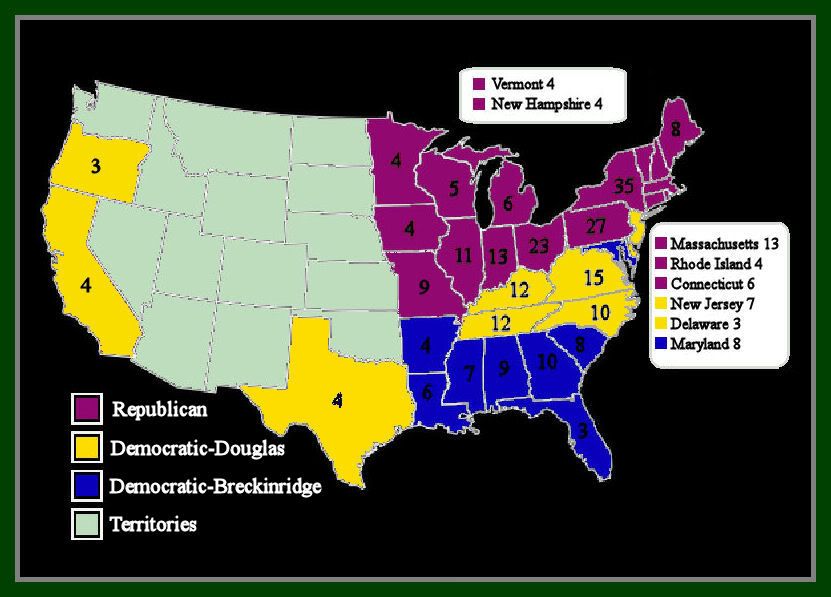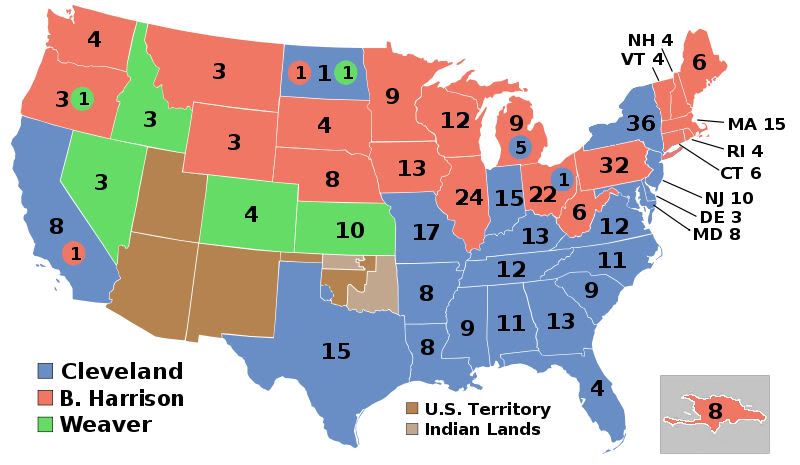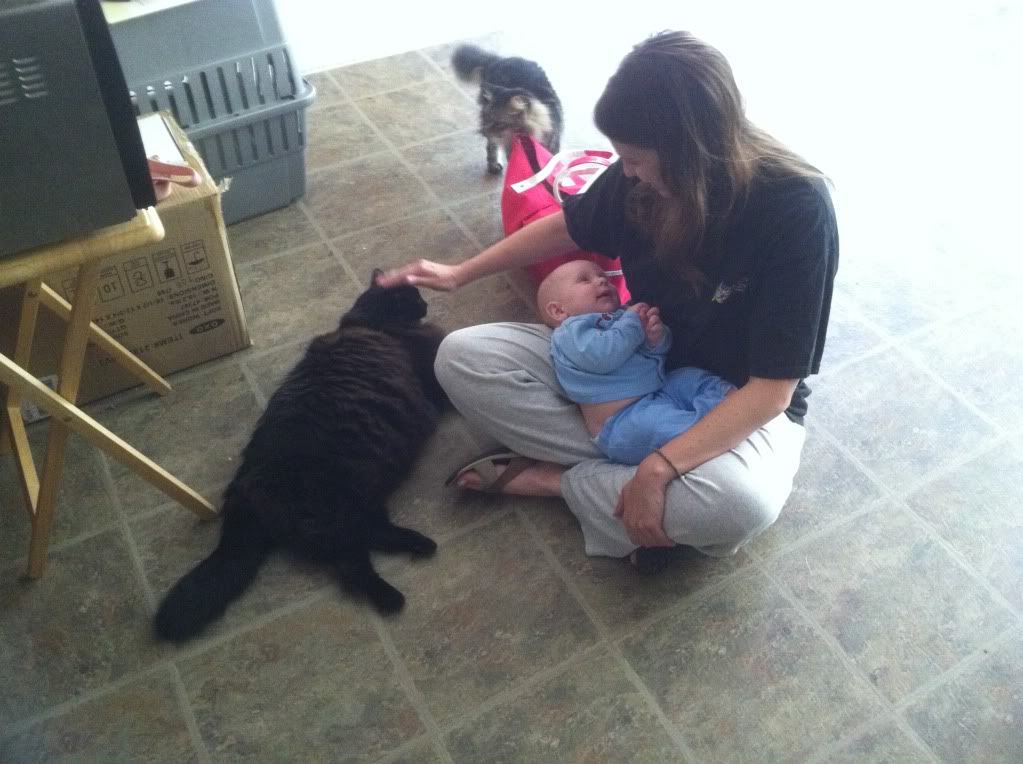“The problem facing the Party, Chauncey, is that we are going to lose.” The speaker was built to the same design as a locomotive, wide and thick with powerful arms and a spade-shaped, cowcatcher-like beard, a resemblance heightened by the puffs of smoke rising from his cigar. He removed the Havana from his mouth and jabbed the air with it for emphasis. “We haven’t got a candidate. We haven’t got an issue that will get the voters out. They didn’t vote our ticket in ‘88, they voted for Winfield Hancock – for the war, and against the Limeys! In the last by-election we lost our majorities in Ohio and Wisconsin. Half a dozen states are leaning away…” He tapped the cigar ash in an elaborate red crystal receptacle. “If we don’t do something, and soon, we are going to lose the Presidency – and likely the Congress as well!”
His audience of one was older and taller, though no less heavy at the shoulders and belly, with an extended nose and a pair of wide ears that made him look like an oncoming bull elephant. “Now Horace, it is not all so bad as that.” He glanced around the lobby, whose classical colonnades and marble were barely visible under the newer, gaudy trappings. What the popular press was calling the Brass Age was in full swing, and the current fashion was to value fittings by weight, volume and expense rather than by effect. In the aftermath of the Atlantic War almost everyone had money, or could borrow it, and the flush of easy credit had promptly led to the worst excesses of crass taste imaginable. Everything was gilded, or bronzed, or slathered in rhinestones, or draped in tassels, or some lurid combination of all of the above. And the colors! Paisleys, plaids and garish stripes vied for prominence, sometimes on the same window. Red velvet had replaced more sober Victorian colors while vivid artificial hues were dumped into carpets like so much spilled paint. The popular humorist Hosea Hogbloom jested that society parties had become too tiring to attend: ‘The man who slows in his motions for a second is apt to be stuffed with flowers, bronzed and made over into a vase, while his wife – should she not be fleet of foot – may be swathed in red velvet and left for a divan of the most overstuffed sort. The result is a mad and continuous dash from place to place, without a moment’s rest lest one be made over as a part of the upholstery!’
“Yes, Chauncey, it is – and worse than that!” The locomotive gathered steam by drawing heavily on his cigar, then punctuated each syllable by bouncing the glowing tip like a coinductor’s baton. Chauncey Depew was too well-bred to roll his eyes but he did rather wish someone would come along and rescue him; he would rather have talked of business than politics, and would have preferred to speak of baseball than either. “The Democrats have given themselves over to that Grange nonsense – to those Progressives. They’re going to throw out everything we’ve accomplished for business in this country, Chauncey! Fair railroad rates for farmers, indeed! Dictating how a railroad sets its rates is only the start! Those Socialists in New York are ranting about a guaranteed minimum wage! Have you ever heard of such a thing? No-one guarantees you a minimum profit, do they?”
“Horace…” Another sidelong look convinced Depew he was not going to be rescued. It would be pointless to try to explain that he worked with legislators every day to guarantee that the railroads he represented were indeed guaranteed to make profits, and high ones at that. Horace Mallow was one of the professional campaign managers working for the Republican Party, and reported to be very good at it, but the man had no understanding of business past knowing that millionaires were to be lovingly cared for. “Very well, Horace. What do you suggest we do? The South will never love us because of the War. The farmers of the West don’t like us because the men who own and run the railroads all vote Republican. Certainly we must insist upon making an honest profit for our investment, or that capital will flow to another, less-burdened field. Our party needs the support of at least one of those regions to keep the Presidency, to say nothing of the Congress. Unless we compromise to woo the Western voters, what would you suggest that we do?”
The shorter man drew hard on his cigar, lifted his eyebrows and leaned in closer. “We should never have taken our foot off the South. There, I’ll say it, if no-one else will.” He pressed the air with his free hand. “But we did, and we can’t very well occupy them again.” For a second, Depew thought he saw longing in the other man’s eyes, and for a certainty he heard a sigh. “We’ll have to conciliate them – give up something that they want, in exchange for their electoral votes. Those states are all run by little juntos – men who can be reasoned with. Not the same as trying to deal with that headless mob in New York City. Compromise with the West is impossible unless you intend to run the railroads into insolvency. The South doesn’t care for our banks and industry, but they are willing to allow us to keep them!”
Depew shifted his weight and leaned down, looming over the shorter man and looking directly into his eyes. “There hasn’t been a Democrat in the White House in twenty-five years, Horace. If you wanted Southern Democrats to pass over that chance, you should have to offer them something substantial.” Mallow looked away and said nothing. Depew leaned in even closer, a bull elephant asserting his dominance. “What. Do. They. Want.”
Mallow flushed and tapped his now-lifeless cigar against the ashtray. “Well. Harrison’s likely to be our man, this time. Hancock hasn’t got anyone in mind, at least.” He looked up at Depew and hurried on. “Yes. Well. There is something before Congress that is of great concern to these Southern fellows. A proposed new constitution for Louisiana. It, um, it…”
“Is an abomination committed to paper.” Neither had noticed a third party enter the conversation until he spoke, frosty distaste dripping from his clear tenor voice like meltwater from an icicle.
“Robert! How very good to see you!” Chauncey Depew turned his attention from Horace Mallow to shake hands with Robert Todd Lincoln. While the two were exchanging greetings, Mallow made to leave, only to find Depew’s giant hand firmly attached to his arm. “Mister Mallow was just explaining to me why my party should support this proposed Louisiana constitution. It seems you have some thoughts on the subject, as well.”
Robert Lincoln’s eyes bulged and his voice rose in pitch and volume. “Support it? Burn the confounded thing in the street, I say!”
“Whatever makes it so repellent to you, Robert?” Depew had not loosed his grip on Mallow, despite the other’s sotto voce protests that he was very late for an appointment.
“It is a sham, Chauncey, a farce of pretty language with malice at its heart. The men who convened, wrote and endorsed that document are the same men who led the South into secession and plunged the Union into war! They no more represent the entirety of the citizens of Louisiana than the three of us speak for the state of New York. What they want is for the Negroes to be dis-enfranchised, and forced to work in the fields as before, and to that end they have concocted this scheme – this monstrosity. The white men of Louisiana propose to restore their old supremacy by instituting a poll tax, and reinstating a requirement that the voter must own property. Already they are denying the claims of the freedmen, on the grounds that men who have tilled their own soil for the past twenty years are incapable of doing so by virtue of their race!”
“The citizens of Louisiana have the right to determine their own government,” Mallow grumbled. “The right, surely, to decide who among them may be eligible to cast a vote, or not.”
Lincoln fixed him with a steely eye. “Half a million men died that this question would be settled, sir! All Americans are free, and all citizens may participate in their own governance. Our founding fathers established that there is no right to government without representation – and to be well represented, a man must have the right to vote. This is a cornerstone of our system of government and no-one must be permitted to overturn it!”
“Not if a man is imprisoned, or if the American in question is female,” Mallow shot back, brushing Depew’s hand from his sleeve and straightening his jacket. “Both are extraordinary instances of citizenship and in neither case does the person enjoy full freedom, or the suffrage. Who are we to say the Negroes of Lousiana are so very different? Across the South there are states that were given over to the administration of the Negroes when their white citizens were dis-enfranchised – stripped of their rights at the order of your father, sir! These men want no more than to set right the morass of inefficiency and corruption that has attended two decades of mis-rule!”
Lincoln purpled and took a step forward; Depew grabbed his sleeve as the other man’s arm rose for a blow. “Robert! Calm yourself, sir! We can have no fisticuffs in the lobby of the Athletic Club!”
Mallow swallowed hard and went gamely on. “The crux of the matter is this, gentlemen – it matters little what you believe, or I, for my own beliefs are not so very different from your own. This constitution will be approved now, and we will receive Southern votes for a Republican President, or the Democrats will carry the Congress and the Presidency in ’92, and – owing us nothing but hatred – pass it anyway!”
“By that standard of logic,” Lincoln ground out, “since you must one day perish, as all mern must, I should receive no blame for killing you myself, this instant!”
Mallow turned upon his heel and snarled, “Good day to you, sir!” His pretense to wounded dignity would have been more effective had his voice not held a tremor of fear, or rage, or perhaps both.
Depew and Lincoln stood silently in the foyer for a long moment before either spoke. “I campaigned for your father, Robert. I believed with all my heart in his messages of freedom, and tolerance, and dignity for all men. How, in so short a time, have we come to this?”
“Politics is but a game to these men,” Lincoln said disgustedly. “No – it is no game, it is more than that. It is life and death! Victory is everything, it is all-consuming. The pursuit of Nike hallows all means if only the end is secured. These men know how to win elections – and they may be right in so far as that – but they know not why.”
Depew regarded him for another moment, elephant eyes sad but resolute. “I will fight them,” he said, finally.
“We will fight them,” Lincoln said. “We must rally everyone we can, and if we lose this election we must nevertheless save the soul of the Party. Such a compromise with principle would leave us open to ridicule, would earn us the abhorrence and disgust of every man alive. And worst of all, Chauncey, we should deserve it.”






